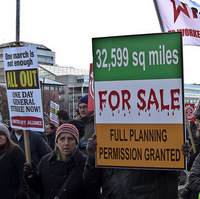Editor's note: This is the second of a two-part series on the fall of Irish Prime Minister Brian Cowen's government. Part I examined the domestic factors leading to the government's collapse. Part II examines the impact of the EU/IMF bailout on Ireland and the European Union.
After almost half a year of lurching from crisis to crisis, the government of Irish Prime Minister Brian Cowen finally fell last week. His fate was effectively sealed at the end of last year by Ireland's $100 billion bailout by the European Central Bank (ECB) and the International Monetary Fund, the only question being when the electoral ax would fall.
The bailout was necessitated by the catastrophic decision to grant a blanket guarantee to Ireland's banks at the end of 2008. While Finance Minister Brian Lenihan declared at the time that it would be "the cheapest bailout in history," the collapse of the Irish property market revealed gaping holes in the banks' balance sheets and widespread questionable fiscal management. The government was ultimately left on the hook for close to $138 billion, almost twice the annual budget. The resulting impact on Ireland's sovereign-debt rating drove interest rates on government bonds into the stratosphere, forcing the government to withdraw from the markets and apply for a bailout.

